工程管理英语论文
工程管理英语作文1500词
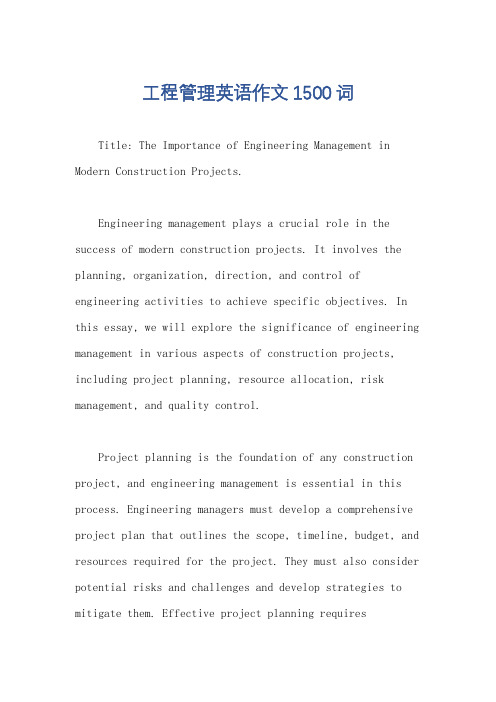
工程管理英语作文1500词Title: The Importance of Engineering Management in Modern Construction Projects.Engineering management plays a crucial role in the success of modern construction projects. It involves the planning, organization, direction, and control of engineering activities to achieve specific objectives. In this essay, we will explore the significance of engineering management in various aspects of construction projects, including project planning, resource allocation, risk management, and quality control.Project planning is the foundation of any construction project, and engineering management is essential in this process. Engineering managers must develop a comprehensive project plan that outlines the scope, timeline, budget, and resources required for the project. They must also consider potential risks and challenges and develop strategies to mitigate them. Effective project planning requiresmeticulous attention to detail and a thorough understanding of the project's requirements. Engineering managers must work closely with other stakeholders, including designers, contractors, suppliers, and clients, to ensure that all aspects of the project are addressed.Resource allocation is another critical aspect of engineering management. Construction projects require a significant amount of resources, including materials, equipment, labor, and funds. Engineering managers must ensure that these resources are allocated efficiently and effectively to maximize project efficiency andprofitability. They must also monitor resource usage throughout the project and adjust allocations as necessary to ensure that the project remains on track.Risk management is an integral part of engineering management in construction projects. Construction projects are inherently risky, and engineering managers must identify, analyze, and mitigate these risks to ensure the project's success. They must develop comprehensive risk management plans that address both known and unknown risksand monitor their implementation throughout the project. Engineering managers must also be prepared to respond quickly and effectively to any unexpected events that may arise during the project.Quality control is another crucial aspect of engineering management in construction projects. Quality is essential to the success of any construction project, and engineering managers must ensure that all work meets or exceeds specified standards and expectations. They must develop and implement quality control plans that cover all aspects of the project, including materials, equipment, workmanship, and finished products. Engineering managers must also conduct regular inspections and audits to ensure that quality standards are being met and take corrective action when necessary.In addition to these core aspects of engineering management, there are several other important considerations. For example, engineering managers must maintain effective communication with all stakeholders throughout the project to ensure that information isflowing freely and accurately. They must also develop and maintain strong leadership skills to inspire and motivate their teams to achieve project goals. Additionally, engineering managers must stay up-to-date with the latest trends and technologies in their field to ensure that their projects are as efficient and effective as possible.In conclusion, engineering management is essential to the success of modern construction projects. It involves planning, resource allocation, risk management, quality control, and communication to ensure that projects are completed on time, within budget, and to the highestquality standards. Engineering managers play a pivotal role in this process and must possess a wide range of skills and knowledge to succeed. By understanding and applying the principles of engineering management, construction projects can be delivered successfully and contribute to the economic and social development of our communities.。
工程管理相关英文作文
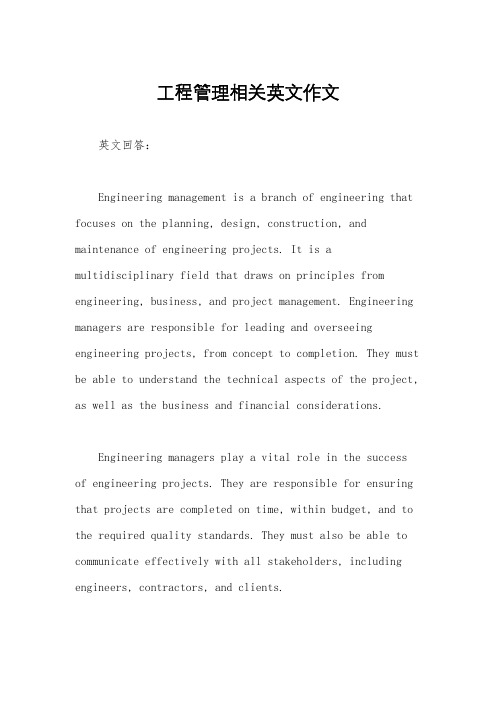
工程管理相关英文作文英文回答:Engineering management is a branch of engineering that focuses on the planning, design, construction, and maintenance of engineering projects. It is a multidisciplinary field that draws on principles from engineering, business, and project management. Engineering managers are responsible for leading and overseeing engineering projects, from concept to completion. They must be able to understand the technical aspects of the project, as well as the business and financial considerations.Engineering managers play a vital role in the success of engineering projects. They are responsible for ensuring that projects are completed on time, within budget, and to the required quality standards. They must also be able to communicate effectively with all stakeholders, including engineers, contractors, and clients.There are a number of different skills and qualifications that are required for success in engineering management. These include:A strong understanding of engineering principles。
工程项目管理英语论文

Abstract:This paper aims to investigate the role of project management in the construction industry through a case study. The study focuses on the application of project management techniques and tools in a real-world construction project. The findings of this research can provide insights into the importance of project management in achieving project success and meeting client expectations.Introduction:The construction industry is one of the largest sectors in the global economy, contributing significantly to the growth of infrastructure and development of nations. However, the construction industry is characterized by complex projects that require efficient management to ensure timely completion and within budget. Project management plays a crucial role in achieving these objectives. This paper presents a case study of a construction project to analyze the importance of project management in the construction industry.Case Study:The case study involves a residential construction project in a major city. The project was a high-rise apartment complex, which included 30 floors and a parking area. The total cost of the project was estimated to be $10 million, and the construction period was set at 24 months.Project Management Techniques and Tools:The project management team employed several techniques and tools to ensure the successful completion of the project. These included:1. Scope Management: The project scope was defined clearly, including the deliverables, objectives, and requirements. The project manager worked closely with the client to ensure that all requirements were met.2. Time Management: A detailed project schedule was developed, and the critical path method (CPM) was used to identify the critical activities and their sequence. The project manager monitored the progress regularly and made adjustments to the schedule as needed.3. Cost Management: The project budget was established, and cost control measures were implemented to ensure that the project stayed within budget. The project manager monitored the actual costs and compared them to the budget to identify any discrepancies.4. Quality Management: A quality management plan was developed to ensure that the project met the required standards. The project manager conducted regular inspections and audits to ensure that the quality of work was maintained.5. Communication Management: Effective communication was established between the project team, client, and stakeholders. Regular meetings were held to discuss progress, issues, and decisions.Results:The project was completed successfully within the stipulated time and budget. The client was satisfied with the quality of work and theoverall project management approach. The project team also received positive feedback from stakeholders regarding the effectiveness of the project management techniques and tools employed.Conclusion:This case study demonstrates the importance of project management in the construction industry. The application of project management techniques and tools helped the project team achieve its objectives and meet client expectations. The findings of this research suggest that effective project management is crucial for the success of construction projects. Construction companies should invest in skilled project managers and adopt project management best practices to ensure project success.Keywords: Project Management, Construction Industry, Case Study, Construction Project, Techniques, Tools。
工程管理专业 英文 作文

工程管理专业英文作文英文:As a project management major, I believe that effective communication and organization are key components to successful project completion. In order to ensure that all team members are on the same page, it is crucial to establish clear goals and expectations from the beginning. This can be achieved through the use of project management tools such as Gantt charts and project plans.Another important aspect of project management is risk management. It is important to identify potential risks and create contingency plans to mitigate them. This can involve conducting a risk analysis and developing a risk management plan.In addition, effective leadership is essential in project management. A good leader should be able to motivate and inspire team members, as well as provideguidance and support when needed. This can involve setting clear expectations, providing regular feedback, and recognizing team members for their contributions.Overall, project management requires a combination of technical skills and soft skills such as communication, organization, and leadership. By utilizing these skills, project managers can ensure that projects are completed on time, within budget, and to the satisfaction of all stakeholders.中文:作为一名工程管理专业的学生,我相信有效的沟通和组织是成功完成项目的关键组成部分。
工程管理英文文献1500词范文
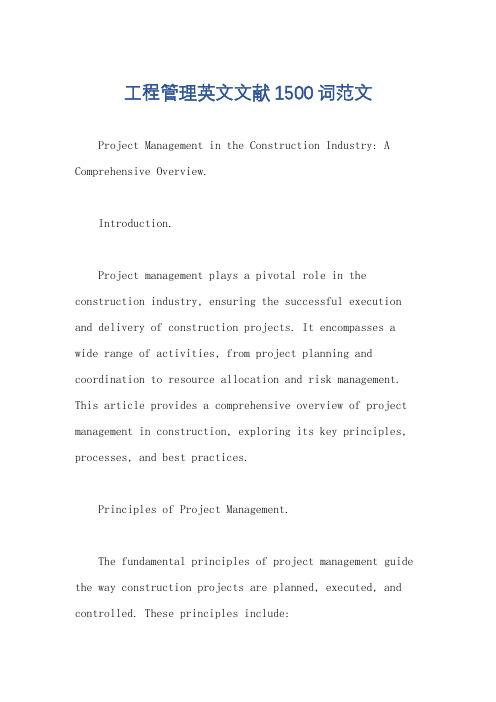
工程管理英文文献1500词范文Project Management in the Construction Industry: A Comprehensive Overview.Introduction.Project management plays a pivotal role in the construction industry, ensuring the successful execution and delivery of construction projects. It encompasses a wide range of activities, from project planning and coordination to resource allocation and risk management. This article provides a comprehensive overview of project management in construction, exploring its key principles, processes, and best practices.Principles of Project Management.The fundamental principles of project management guide the way construction projects are planned, executed, and controlled. These principles include:Project Planning: Establishing a clear and detailed plan that outlines project objectives, scope, deliverables, and timelines.Communication: Maintaining effective communication among project stakeholders, including owners, contractors, suppliers, and consultants.Risk Management: Identifying and mitigating potential risks that may impact project outcomes.Collaboration: Fostering teamwork and collaboration among project members to achieve common goals.Control: Regularly monitoring and evaluating project progress to ensure adherence to plans and objectives.Project Management Processes.Project management in construction involves several key processes that are typically executed sequentially:1. Project Initiation: Defining the project scope, objectives, and feasibility.2. Project Planning: Developing a detailed project plan that outlines tasks, resources, and timelines.3. Project Execution: Implementing the project plan and managing resources to achieve project deliverables.4. Project Monitoring and Control: Tracking progress, identifying deviations, and taking corrective actions to ensure successful project completion.5. Project Closure: Finalizing deliverables, completing documentation, and evaluating project performance.Best Practices in Project Management.To optimize project outcomes, construction industry professionals follow established best practices, such as:Use of Project Management Software: Utilizing project management software can streamline planning, scheduling, and collaboration.Stakeholder Engagement: Actively engaging project stakeholders throughout the project lifecycle to ensure alignment and buy-in.Risk Management Framework: Implementing a structured risk management framework to identify, assess, and manage project risks effectively.Change Management Process: Establishing a clear and proactive process for managing project changes to minimize disruptions and ensure project success.Continuous Improvement: Regularly reviewing project performance and seeking opportunities for improvement to enhance future project outcomes.Benefits of Effective Project Management.Effective project management in construction brings numerous benefits, including:On-Time Delivery: Adherence to project schedules and timelines, meeting stakeholder expectations.Cost Control: Managing project costs effectively, minimizing overruns and staying within budget.Quality Assurance: Ensuring high-quality construction outcomes that meet project specifications and industry standards.Risk Mitigation: Identifying and managing risks proactively, safeguarding projects from potential threats and ensuring smooth execution.Improved Stakeholder Satisfaction: Maintaining strong relationships with project stakeholders by delivering successful projects that align with their needs and objectives.Conclusion.Project management is essential for the successful execution of construction projects. By understanding its key principles, following established processes, and implementing best practices, construction industry professionals can optimize project outcomes, ensure on-time delivery, control costs, manage risks, and enhance stakeholder satisfaction. As the construction industry continues to evolve, leveraging advanced technologies and innovative approaches to project management will become increasingly critical for project success.。
工程项目管理论文外文
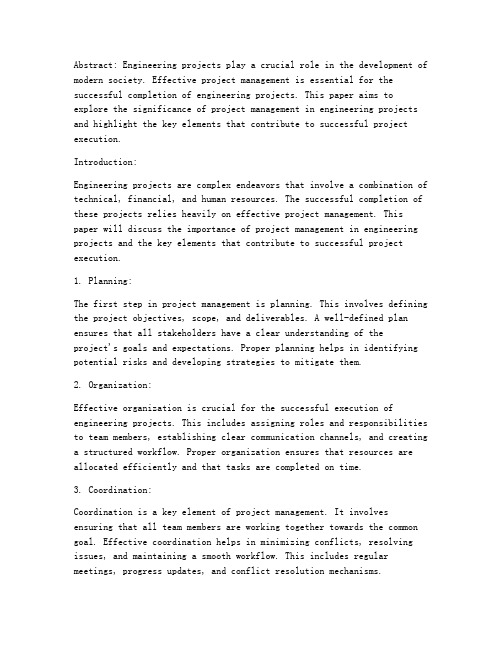
Abstract: Engineering projects play a crucial role in the development of modern society. Effective project management is essential for the successful completion of engineering projects. This paper aims to explore the significance of project management in engineering projects and highlight the key elements that contribute to successful project execution.Introduction:Engineering projects are complex endeavors that involve a combination of technical, financial, and human resources. The successful completion of these projects relies heavily on effective project management. This paper will discuss the importance of project management in engineering projects and the key elements that contribute to successful project execution.1. Planning:The first step in project management is planning. This involves defining the project objectives, scope, and deliverables. A well-defined plan ensures that all stakeholders have a clear understanding of theproject's goals and expectations. Proper planning helps in identifying potential risks and developing strategies to mitigate them.2. Organization:Effective organization is crucial for the successful execution of engineering projects. This includes assigning roles and responsibilities to team members, establishing clear communication channels, and creating a structured workflow. Proper organization ensures that resources are allocated efficiently and that tasks are completed on time.3. Coordination:Coordination is a key element of project management. It involves ensuring that all team members are working together towards the common goal. Effective coordination helps in minimizing conflicts, resolving issues, and maintaining a smooth workflow. This includes regular meetings, progress updates, and conflict resolution mechanisms.4. Control:Controlling the project involves monitoring the progress, identifying deviations from the plan, and taking corrective actions. This helps in ensuring that the project is on track and that any issues are addressed promptly. Key performance indicators (KPIs) and project management software can be used to track progress and identify potential risks.5. Quality Management:Quality management is critical in engineering projects to ensure that the final deliverable meets the required standards. This involves implementing quality control processes, conducting regular inspections, and ensuring compliance with relevant regulations and standards. Quality management also includes addressing any issues that arise during the project lifecycle.6. Risk Management:Risk management is an essential aspect of project management. It involves identifying potential risks, assessing their impact, and developing strategies to mitigate them. Effective risk management helps in minimizing the likelihood of project delays, cost overruns, and quality issues.Conclusion:In conclusion, effective project management is essential for the successful completion of engineering projects. Proper planning, organization, coordination, control, quality management, and risk management are key elements that contribute to successful project execution. By focusing on these aspects, project managers can ensurethat engineering projects are completed on time, within budget, and meet the required quality standards.。
工程管理专业英语作文120字
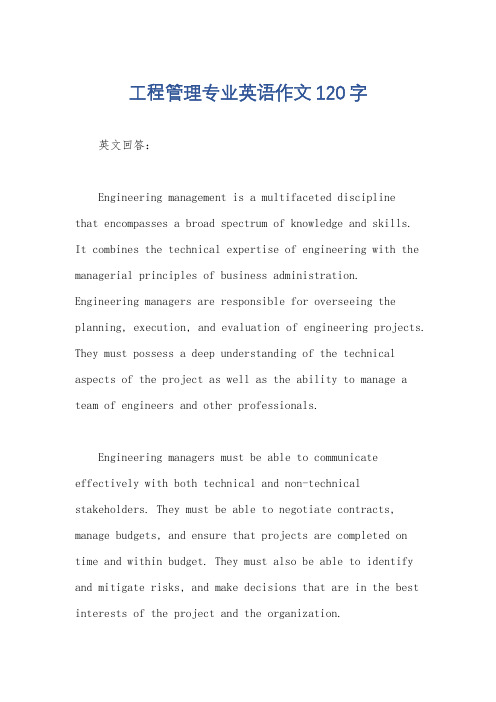
工程管理专业英语作文120字英文回答:Engineering management is a multifaceted disciplinethat encompasses a broad spectrum of knowledge and skills.It combines the technical expertise of engineering with the managerial principles of business administration. Engineering managers are responsible for overseeing the planning, execution, and evaluation of engineering projects. They must possess a deep understanding of the technical aspects of the project as well as the ability to manage a team of engineers and other professionals.Engineering managers must be able to communicate effectively with both technical and non-technical stakeholders. They must be able to negotiate contracts, manage budgets, and ensure that projects are completed on time and within budget. They must also be able to identify and mitigate risks, and make decisions that are in the best interests of the project and the organization.Engineering management is a challenging and rewarding career path. It offers opportunities for professionals to make a significant contribution to the development and implementation of new technologies. Engineering managers can work in a variety of industries, including manufacturing, construction, healthcare, and aerospace.中文回答:工程管理是一个多方面的学科,包含广泛的知识和技能。
工程管理方法英文作文
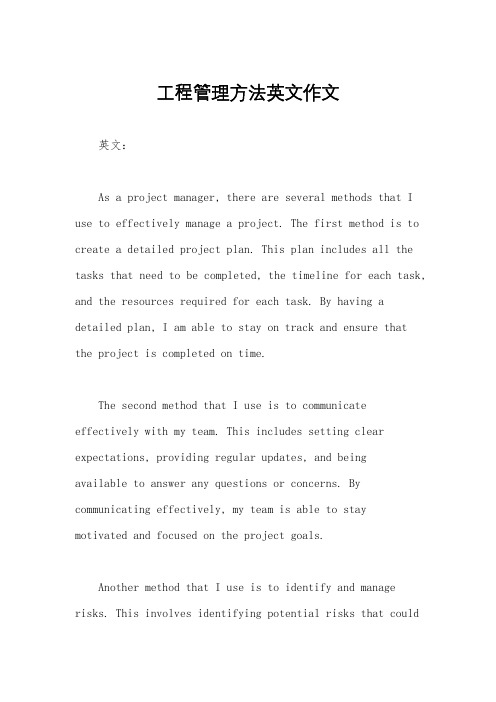
工程管理方法英文作文英文:As a project manager, there are several methods that I use to effectively manage a project. The first method is to create a detailed project plan. This plan includes all the tasks that need to be completed, the timeline for each task, and the resources required for each task. By having a detailed plan, I am able to stay on track and ensure that the project is completed on time.The second method that I use is to communicateeffectively with my team. This includes setting clear expectations, providing regular updates, and beingavailable to answer any questions or concerns. By communicating effectively, my team is able to staymotivated and focused on the project goals.Another method that I use is to identify and manage risks. This involves identifying potential risks that couldimpact the project and developing a plan to mitigate those risks. By being proactive in identifying and managing risks, I am able to minimize any negative impact on the project.Lastly, I believe in continuous improvement. This means that I am always looking for ways to improve my project management skills and processes. Whether it's attending training sessions or seeking feedback from my team, I am constantly striving to become a better project manager.中文:作为一个项目经理,我采用了几种方法来有效地管理项目。
- 1、下载文档前请自行甄别文档内容的完整性,平台不提供额外的编辑、内容补充、找答案等附加服务。
- 2、"仅部分预览"的文档,不可在线预览部分如存在完整性等问题,可反馈申请退款(可完整预览的文档不适用该条件!)。
- 3、如文档侵犯您的权益,请联系客服反馈,我们会尽快为您处理(人工客服工作时间:9:00-18:30)。
工程管理专业英语Working Title:Contract management of construction projectClass:Name:Number:Working titleA critical analysis of contract management of construction project.Purpose of studyContract management is an important part of project management, engineering project management through the whole process, not only determine the price of the project construction period, objectives, the quality objectives, obligations and responsibilities, and contract management is other project management system of work instructions, and the engineering project management played the overall control function. In the fierce market competition, the construction enterprise in order to be able to win the bid to get at the low success, however low quoted price behind success is the management level of the enterprise competition. At the same time due to construction enterprise as a contractor often and in a relatively passive position in the whole process of construction of the project are often natural conditions and social factors, such as the unforeseen factors, lead to risk all may happen at any time, it is for the existence of the objective factors and uncertainty, construction enterprises must improve the level of management, enhance the contract management consciousness. No contract management is no management goal, no management goal will not project management system forming, of course, will be difficult to achieve .The project management profit objectives, and even cause project paralyzed, unable to operate.Contract management is serviced for the goal of the project and the general target of the enterprise, to ensure to achieve them. Specifically, contract management includes:(1) The whole project in the planned cost (investment), to complete the project within a predetermined range, meet the quality and function of predetermined requirements, implementation of the three objectives of the project.(2) The implementation of the project smoothly, the contract dispute is less, the contract can coordinate with each other, are able to perform the contract responsibility successfully.(3) To ensure that the entire project contract signing and implementation process meets the requirements of the law.(4) A successful contract management, but also at the end of the work that was satisfactory to both parties, the owners get a qualified project, achieve the investment objective, on the project, the contractor, feel the cooperation of both sides satisfied; the contractor not only obtain the reasonable price and profit, but also won a reputation, to establish the friendly and cooperative relations. This is the requirements what the enterprise management and the development strategy need the contract management to do.AimTo use the theory to ensure the project can be carried out smoothly Objectives1)ObjectiveMacroscopically, the objective of the contract management is to strengthen supervision and management of construction activities, maintain the market order,guarantee quality and safety of the project,simulative construction industry health develops, To provide a legal basis for every part of a project,at the same time, will definitely provide useful help to construction industry to take an active role in the international standardization activities。
(1)Standardize the market main body, market price and market transaction(2) Improvement of modern enterprise system(3) Improve the contract performance ratio(4) Trying to expand into international markets.2) TasksThe main task of construction contract management is implemented to promote the project legal person responsibility system, bidding system, project supervision system and contract management system, and coordinate the relationship between "four system”the specification of various contract style and format, that between the main body of the construction market trading activities by contract.(1) Ensure to development construction(2) Standardize the procedures and main body(3) Improve the level of contract management(4) Avoid illegal and criminal.Hypothesis key questionThe owner-contractor agreement formalizes the contract. It generally includes a description of the project and contract sum. Other clauses pertaining to alternates accepted, completion date, bonus and penalty clauses, and any other items that should be amplified are included. Therefore, the contract is the core of the project management, contract management throughout the whole process of project implementation, control and ensure the implementation of the whole project .In modern project, if has no contract sense then has no established aim, if has no contract management then it is difficult to form a system, it will not be able to achieve the objectives of the project.(1)Problem about breach of contract. A clear contract can reduce or even avoid defaults. A contract is imbalance, starting from the contract signing and contains a default. The owner’s purpose is to get the project according to the quality of products. Therefore, the owner should forecast default of contract, so as to avoid one-sided contract terms and other causes of contract default, to the owner cause irreparable damage. The way of solving the default problem is added strain terms of the contract, can take preventive measures and inspire the contractor to perform the contract.(2)Problem about contract form. Contract form in the tendering document is very important. Common phenomenon is that the budget price exceeds the budget price; contract price exceeds the budget price, settlement price over the contract price. Under the mode of BOQ valuation, if BOQ is not accurate or flaw is more, then it may appear the phenomenon that contracts more opening. How to control the opening of the contract? For small-scale projects and short duration projects can adopt the fixed price contract.(3)Material bargaining problem. Materials and equipment bargaining range should be as few as possible, should be limited to a higher grade on the market, price bidding large, and is not easy to determine the materials and equipment. Material and equipment bargaining range influence the size of the opening of the contract. For the majority of ordinary materials prices should be in the bidding by the competition among the bidders to confirm, but not confirmed in the course of performance or settlement. When bidding and engineering materials price differentials in risk category, the owner shall undertake the risks of price decline, the contractor shall bear the risk of rising prices. The owners negotiate a price too much, not only increasing the material equipment bargaining workload, and increase the difficulty of cost control. When the two sides on the material aspects of bargaining dispute, it will affect the project schedule and project quality. Of course, as far as possible to reduce material and equipment bargaining range doesn't mean completely abolished bargaining of material and equipment.(4)Project risk. Risk prediction, and risk management should be an important part. Due to the level of project risk management lag and people's awareness of risk is weak, risk management is part of the project management what is extremely weak, must pay high attention to it. With the formal implementation of project quantity list valuation standard, a consistent with the project insurance and engineering security management of international insurance industry and surveyors industry has be imperative.In addition, contract management of construction project should be confirmed, identification, risk degree of risk management and to determine the risk countermeasure, thus carries on the risk management of the project effectively.Outline methodologyThe basic principles of contract management of construction project.(1)The contract management should be based on laws, contract management can be conducted and must be undertaken with the respect of the law that can ensure the fundamental interests of the owners and promote construction. There are two kinds of law is closely related to the contract management of construction project, one kind is the civil and commercial law including law and contractlaw, one is the economic law includes the construction method and the Bidding Law. Contract management personnel should be familiar with these laws and be able to skillfully use, to ensure the legitimacy of the terms of the contract, in order to guarantee the validity of the clause. The interests of owners is the rights and interests of the law of owners, if the terms of the contract is invalid due to illegal, the fundamental interests of owner is no guarantee.(2) The contract management should be based on the actual situation of construction project as the starting point and the breakthrough point to ensurethe construction quality, the progress, the cost of three goalssuccessfully completed and put into use. Contract management shouldmake scientific contract management plan according to the actual way of the construction project, developed by the stronger the terms of the contract, andthe goal of the project operation in terms of quality, schedule, cost shouldbe all project management includes contract management, the program, any contract or any terms of the contract shall be reflect and carry out the above objectives, only [n this way ,contract management will play a important role in contract management of construction.(3) The contract management should be based on prevention, reduce or even avoid the disputes and claims. Prevention is one of the effective methods to control risk. The owner should consider various risks in the process of project management and try to develop method in controlling risk and reflected in the specific terms of the contract. At the same time, we should ensure that the terms of the contract clear and concrete, to avoid ambiguityand vagueness.(4) Record the rights, obligations and responsibilities of each contractor in contract management. This allows the construction of any party to the contract as the basis, has the rights, obligations and ensure the completion and use of construction project.Proposed contentsThe concept of contract management of Construction projectContract management is related to planning, sign, performance, change, claim and dispute in the management, it is an important part of project management. To determine the relationship between rights of two partiesThe contract’s characteristicsThe essence of contract is to standardize the market transactions, saving transaction costs.Contract management includes:(1) ParticularityEvery bid of contract has particularity and can not be replaced(2) Long-termBecause of structure is complex, workload is big, construction period is long, the contract time limit for performance is longer.(3) Diversity and complexityOnly two parties, but the main parties is more, the contract performance period is long, the amount is large, legal relationship is complex.(4) StringencySubject to strict supervision, sides must be Legal person, contract mustconform to national regulation, and the contract should be strictlyTypes of agreement(1)Lump-sum agreement(2)Unit-price agreement(3)Cost-plus-fee agreementIn the Lump-sum agreement, the contractor agrees to construct the project, in accordance with the contract documents, for a set price arrived at through competitive bidding or negotiation. The contractor agrees that the work will be satisfactorily completed regardless of the difficulties encountered .this type of agreement provides the owner advance knowledge of construction costs and requires the constructor to accept the bulk of the risk associated with the project.There are some disadvantages and risks placed upon the general contractor. The contractor must complete the work at a guaranteed price even though the costs were only estimated. Because of the very nature and risks with the Lump-sum price, it is important that the contractor be able to accurately understand the scope of the project work required at time of bidding.In the unit-price agreement the contractor bases the bid on estimated quantities of work and on completion of the work in accordance with the contract documents .the owner of the contracting agency typically provides the quantity takeoff. This type of contraction is most prevalent in road construction. It allows the contractor to spend most of their time working on pricing the labor and materials required for the project while checking for the most economical approach to handle the contraction process.Under lump-sum contracts each contractor does a quantity takeoff, which considerably increases the chances for quantity errors and adds overhead to all the contractors.In cost-plus-fee agreements the contractor is reimbursed for the construction costs as defined in the agreement .however, the contractor is not reimbursed for all items, and a complete understanding of reimbursable and nomreimbursable items is required. This agreement is often used when speed, uniqueness of the project, and quality take precedence. This contract arrangement allows for construction to begin before all the drawings and specifications are completed, thus reducing the time required to complete the project. The contract should detail accounting requirements, record keeping, and purchasing procedures.Cost-plus type contracts include a project budget developed by all members of the project team.Percentage fee. The percentage fee allows the owner the opportunity to profit if prices go down and changes in the work may be readily made. The major disadvantage is that the fee increases with construction costs, so there is little incentive on the contractor’s part to keep costs low.Fixed fee. The advantage of the fixed fee include the owner’s ability to reduce construction time by beginning construction before the drawings and specifications are completed, thus removing the temptation for the contractor to increase costs or cut quality while maintaining a professional status. Among the disadvantages are that the exact cost of the project is not known in advance, extensive accounting is required, and that keeping costs low depends on the character and integrity of the contractor.Fixed fee with guaranteed maximum costs. Advantage of this fixed fee is that a guaranteed maximum cost is assured to the owner: it generally provides an incentive to contractor to keep the costs down since they share in any savings. Again, the contractor assumes a professional status.Sliding scale fee. The sliding scale fee provides an answer to the disadvantages of the percentage fee, because as the cost of the project increases, the percentage fee of construction decreases. The contractor is motivated to provide strong leadership so that the project will be completed swiftly at a low cost. Disadvantages are that the cost cannot be predetermined, extensive changes may require modification of the scale, and extensive accounting is required.Fixed fee with a bonus and penalty. With this type of fixed fee, the contractor is reimbursed the actual cost of construction plus a fee. A target cost estimate is set up and, if the cost is less than the target amount, the contractor receives a bonus of a percentage of the savings. If the cost goes over the target figure, there is a penalty.Changes in contractIt is standard practice that a construction contract gives the owner the right to make changes in the work within the general scope of the contract during the construction period. Depending on the contract and its terms, such changes might involve additions to or deletions from the contract, modifications of the work, and changes in the methods or manner of work performance, changes in owner-provided materials or facilities, or even changes in contract time requirements.On a unit-price contract, changes are automatically tract, unless changed work involves items that were not included in the original contract, unless the changes are so extensive the contractor and owner is authorized by the contract to request adjustment in the unit prices affected, or unless an extension of time will be required. When a change to a publicly financed project is involved, the contractor may be well advised to determine if the change is with in the scope of the changes clause of the contractor and that public agency has followed the procedural requirements of the applicable statue.When the owner or its agent orally approved the additional work and promised to pay extra for it, had knowledge that it was being performed without written authorization and did not protest, the courts have ruled either that the work was done under an oral contract separate and distinct from the written one or that the clause requiring written authorization was waived. The courts have sometimes disregarded the requirements for a written order on the grounds that it is unjust enrichment for the owner to enjoy the benefit without having to pay for it.It is presumed that such a contract modification has taken into account all prior negotiations and understandings leading up to its signing and also that the terms of each change order reflect proper consideration of these negotiations.Initial reference1.方三中.浅议建筑工程施工合同[J].科技资讯,2007(21):1892.黄劲伟. 工程量清单计价的合同管理[J].福建建设科技,2005,(6):833.陈淑花.工程量清单计价模式下如何更好地履行合同[J].中国新技术新产品,2008,(7):14~174.何红锋.建设工程合同管理 [M].北京:机械工业出版社,2006.5.丁晓欣.建设工程合同管理 [M].北京:化学工业出版社,2005.6.朱昊.建设工程合同管理与案例评析[M].北京:机械工业出版社,2008,06,01.7.李启明.土木工程合同管理 [M].南京:东南大学出版社, 2002.8.贾孝良.浅谈建筑上的合同管理 [J].中国科技信息,2005,(24)Work planContract management is an important part of project management. As the project manager, project contract management to enhance the awareness of risk prevention, the risk of possible future contract to a minimum, to have a cautious and conscientious attitude, take the law as the criterion. Continuously improve yourself in the future work, continue to strengthen the learning.。
